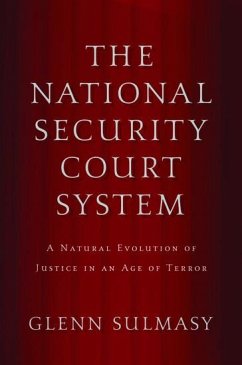The recent Boumediene v. Bush decision, which tossed aside the dysfunctional military court system envisioned by the Bush administration and upheld the right of habeas corpus for detainees, promises to throw national security law into chaos, and will also probably lead to the closing of Guantanamo. In this timely and much-needed book, Glenn Sulmasy, one of America's leading experts on national security law, opens with a much-needed history of America's long and complicated experience with such courts since the early days of the Republic. After tracing their evolution in the contemporary era, Sulmasy argues for a more sensible approach to the global war on terror's unique set of prisoners. He proposes a reasonable "third way" solution that avoids even more extreme measures, on the one hand, and a complete shuttering of the court system, on the other. Instead, he advocates creating a separate standing judicial system, overseen by civilian judges, that allows for habeas corpus appeals and which focuses exclusively on existing war-on-terror cases as well as the inevitable cases to come. For all those who want to explore the crucial legal issues behind the headlines about Gitmo and the rights of detainees, The National Security Court System offers a clear-headed assessment of where we are and where we ought to be going.
In the last few years, military courts, military commissions, Gitmo, and 'Hamdan' have become stock terms on the front pages of America's leading newspapers. But how much do we really know about the larger system they function in? Does it work well, or is it a disaster? Glenn Sulmasy, probably the nation's leading expert on the topic of military commissions and national security courts, explains how the system originated, how it operates, and why it is beset by so many problems and so much controversy. He begins by charting the court system's historical trajectory up to the current predicament. The recent Boumediene v. Bush decision, which tossed aside the dysfunctional national court system envisioned by the Bush administration and upheld the right of habeas corpus for detainees, promises to throw national security law into chaos, and will also probably lead to the closing of Guantanamo. Arguing that there needs to sensible approach to the global war on terror's unique set of prisoners, Sulmasy closes with a reasonable "third way" solution that tacks between doubling down and shuttering the court system. He instead advocates creating a separate standing judicial system that allows for habeas corpus appeals and which focuses exclusively on existing war-on-terror cases as well the inevitable cases that will arise in coming years. Authoritative, clear, and tightly argued, this book will be the definitive work on the subject.
In the last few years, military courts, military commissions, Gitmo, and 'Hamdan' have become stock terms on the front pages of America's leading newspapers. But how much do we really know about the larger system they function in? Does it work well, or is it a disaster? Glenn Sulmasy, probably the nation's leading expert on the topic of military commissions and national security courts, explains how the system originated, how it operates, and why it is beset by so many problems and so much controversy. He begins by charting the court system's historical trajectory up to the current predicament. The recent Boumediene v. Bush decision, which tossed aside the dysfunctional national court system envisioned by the Bush administration and upheld the right of habeas corpus for detainees, promises to throw national security law into chaos, and will also probably lead to the closing of Guantanamo. Arguing that there needs to sensible approach to the global war on terror's unique set of prisoners, Sulmasy closes with a reasonable "third way" solution that tacks between doubling down and shuttering the court system. He instead advocates creating a separate standing judicial system that allows for habeas corpus appeals and which focuses exclusively on existing war-on-terror cases as well the inevitable cases that will arise in coming years. Authoritative, clear, and tightly argued, this book will be the definitive work on the subject.








